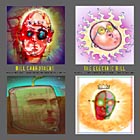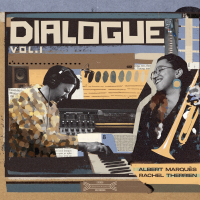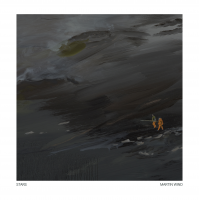Home » Jazz Articles » Album Review » Bill Carrothers: The Electric Bill
Bill Carrothers: The Electric Bill
You'd never know from its visceral, jammy-yet-composed nature, but this set of tunes has its formative origins in high-concept historical basis; in essence, the history of continual change in America. Check out the song titles, then hear how Bill's compositions reflect America's recurring process of rebellion, revolution and evolution. Taken in conjunction with 1998's The Blues and the Grays , we can conclude that the leader here finds a wellspring of inspiration in high school's most sleep-inducing subject-American history. But this one is, in spots, flowing, funky, lyrical, reflective and fun-the only thing certain in life is change, after all- and Bill's written some rather cool and loose changes to accompany that paradigm. He's also made one of the three great Rhodes records that have come to my attention in 2002. That he has done so using no adornments to the instrument's tone or timbre, on an axe with a rich history of enhancement via little colored boxes, is a testament to his considerable compositional and playing abilities.
In the same way the Happy Apple kids screw with jazz convention, Bill screws with what you think you may already know about him. I'd be interested to know how many gigs or sessions he does a year that are like this. "Wrong, Wrong, Wrong" starts things off non- catastrophically, with long periods of silence, some vibrato on piano and circular breathing by Lewis. "Rebellion' gets the blood pumping, a crazy New Orleans shuffle groove supported by a bass vamp with a soprano melody later doubled on piano. This song is a primer on what makes Dave King so special-a real original on the American musical map. Neal Peart meets Bill Bruford at Tony Williams' rehearsal space- this guy is just incredibly capable of emphasizing whatever subdivision of the beat so moves him from moment to moment, without ever letting his monster groove slide. So many sounds emanate from his tuned traps-he gets more tones from the kit than those ultra-endorsed Sports Illustrated drummers using rigs five times the size. Lewis' hyper speed lyricism and non-lyricism is featured here along with Carrothers' take on those close voicings originated by Herbie's (Bill himself cites Live Evil -era Keith Jarrett as a big electric influence) left hand in direct response, it seems, to the particular sonorities of the Rhodes. Make sure to dig the drummer's ending..a segue that just stops... and works.
"Voice of the People" is prettily somber and melodically determined, with Anderson's classically rugged, singing ,long-toned and finely recorded presence providing a solo prelude to the remainder of this drunkenly jazzy, smoky cut. Lewis surprises with a solo that's different for him - all silkily supple - while Carrothers emphasizes the Rhodes' angelic high tones, cascading backward on each other in this decidedly non-jammy, elegant jazz tune. Three tunes in, Carrothers has proven his mastery of Rhodes styles, all accentuating the purer, unaffected side of the instrument. "Evolution" is about propulsion and King's way with a hip slip trip. Carrothers stacks chords with the right and left hands for one of the sounds that makes the Rhodes so enjoyable-packed clusters of harmonies prolonged and highlighted by the instrument's intangibles. Lewis extrapolates profusely over the top, exhorted onward by King, both percussively and verbally.
"Aftermath" gets my vote for hippest composition and hottest soloing on the date, with an intro featuring a climbing soprano sax motif, the interims between which grow shorter as the head develops. The chord progression grows gradually more complex over a one-note bass vamp, turning into quite the vehicle for Lewis to take a star turn over, emphasizing sweetness that deftly skirts any soft/smooth cliché. Carrothers allows himself ample opportunity to extrapolate on his own invention, beginning with bop-laced linearity, succeeded by chordal complexity.
Only time will tell how often Bill's electric Hyde will subvert his acoustic Jekyll. I'll say this much-here's the only time I hope "The Electric Bill" comes more often. Available as a French import from Dreyfus/Birdology , the best source for this one in the states is through Bill's website at bridgeboymusic.com .
Track Listing
1. Wrong, Wrong, Wrong, 2. Rebellion, 3. Voice of the People, 4. Evolution, 5. The Castaways, 6. Aftermath, 7. A Kindred Spirit, 8. Mojo Clinton, 9.Sing
Personnel
Bill Carrothers
pianoBill Carrothers - Fender Rhodes piano (suitcase model), Dave King-drums, Mike Lewis-tenor and soprano saxophones, Reid Anderson-bass
Album information
Title: The Electric Bill | Year Released: 2002 | Record Label: Dreyfus Records
Tags
PREVIOUS / NEXT
Support All About Jazz
 All About Jazz has been a pillar of jazz since 1995, championing it as an art form and, more importantly, supporting the musicians who make it. Our enduring commitment has made "AAJ" one of the most culturally important websites of its kind, read by hundreds of thousands of fans, musicians and industry figures every month.
All About Jazz has been a pillar of jazz since 1995, championing it as an art form and, more importantly, supporting the musicians who make it. Our enduring commitment has made "AAJ" one of the most culturally important websites of its kind, read by hundreds of thousands of fans, musicians and industry figures every month.





















